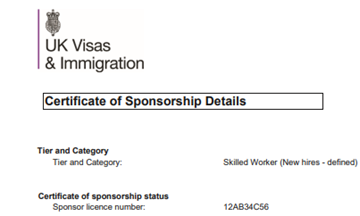Weighing the Balance: The Pros and Cons of Sponsoring an Immigrant
Key Considerations for Employers Sponsoring Immigrant Workers in 2025

Sponsoring immigrant workers can be a transformative decision for businesses, especially amidst labour shortages and evolving immigration policies. While the benefits can be significant, there are also important challenges to consider. In this updated guide, we explore sponsorship's latest pros and cons, offering practical advice for UK employers navigating the immigration landscape.
The Benefits of Sponsoring Immigrant Workers
Access to a Wider Talent Pool
Sponsorship enables businesses to access skilled workers from around the world. With increasing shortages in sectors like construction, healthcare, and technology, tapping into the global talent pool can help fill critical roles and keep projects on track.
Enhanced Diversity and Innovation
Sponsored employees often show loyalty to their employers due to the investment made in their sponsorship. This can lead to reduced turnover and a more stable workforce.
Companies can directly contribute to economic growth by hiring skilled international workers, enabling better service delivery, innovation, and expansion opportunities.
The Challenges of Sponsorship
High Costs
Employers must adhere to strict Home Office compliance requirements, such as maintaining accurate records, reporting changes in employee status, and passing audits. Non-compliance can result in fines, licence revocation, or reputational damage.
Sponsored employees must work in roles directly controlled by their sponsor. Contracting them out to third parties or roles outside the specified occupation code is prohibited, which may limit flexibility.
The UK immigration system is dynamic, with changes to salary thresholds, eligible roles, and compliance requirements. Staying informed and adaptable is essential but can be resource-intensive.

Latest Updates for 2025
Salary Requirements
Replacing the Shortage Occupation List, the vastly reduced Immigration Salary List outlines roles eligible for salary discounts. For example, certain construction roles may qualify for a reduced threshold of £20,960 or 80% of the "going rate," whichever is higher.
- Immigration Health Surcharge (IHS): £1,035 per year for adults, £776 per year for under-18s.
- Work visa fees: £719 for up to 3 years; £1,420 for over 3 years.
- Certificate of Sponsorship (CoS): £199.
- Priority Service: £500 for in-country applications.
Physical Biometric Residence Permits (BRPs) have been replaced with e-visas for most visa categories. Employers must use the Home Office online portal to verify employee work eligibility.
Practical Tips for Employers
- Plan Ahead
Anticipate workforce needs early to account for processing times, which can take up to 8 weeks or more without priority service. - Streamline Compliance
Implement robust HR processes to meet sponsorship duties, including keeping up-to-date employee records and reporting changes promptly. - Leverage Professional Expertise
Partnering with immigration experts, such as Immtell, can help navigate complex rules, reduce administrative burdens, and maximise sponsorship benefits. - Focus on Retention
Invest in employee engagement and support, ensuring your sponsored workers feel valued and motivated to contribute long-term.

Immtell’s Support for Sponsors
Sponsoring immigrant workers can be both rewarding and challenging. At Immtell, we specialise in helping businesses navigate UK immigration with practical advice and guidance. From obtaining a sponsor licence to managing compliance and supporting visa applications, we provide tailored solutions to meet your needs.


Ready to Build Your Dream Team?
Let Immtell guide you through the sponsorship process, ensuring compliance and success. Contact us today to discuss your recruitment needs and secure the talent your business deserves.
Let Immtell guide you through the sponsorship process, ensuring compliance and success. Contact us today to discuss your recruitment needs and secure the talent your business deserves.










